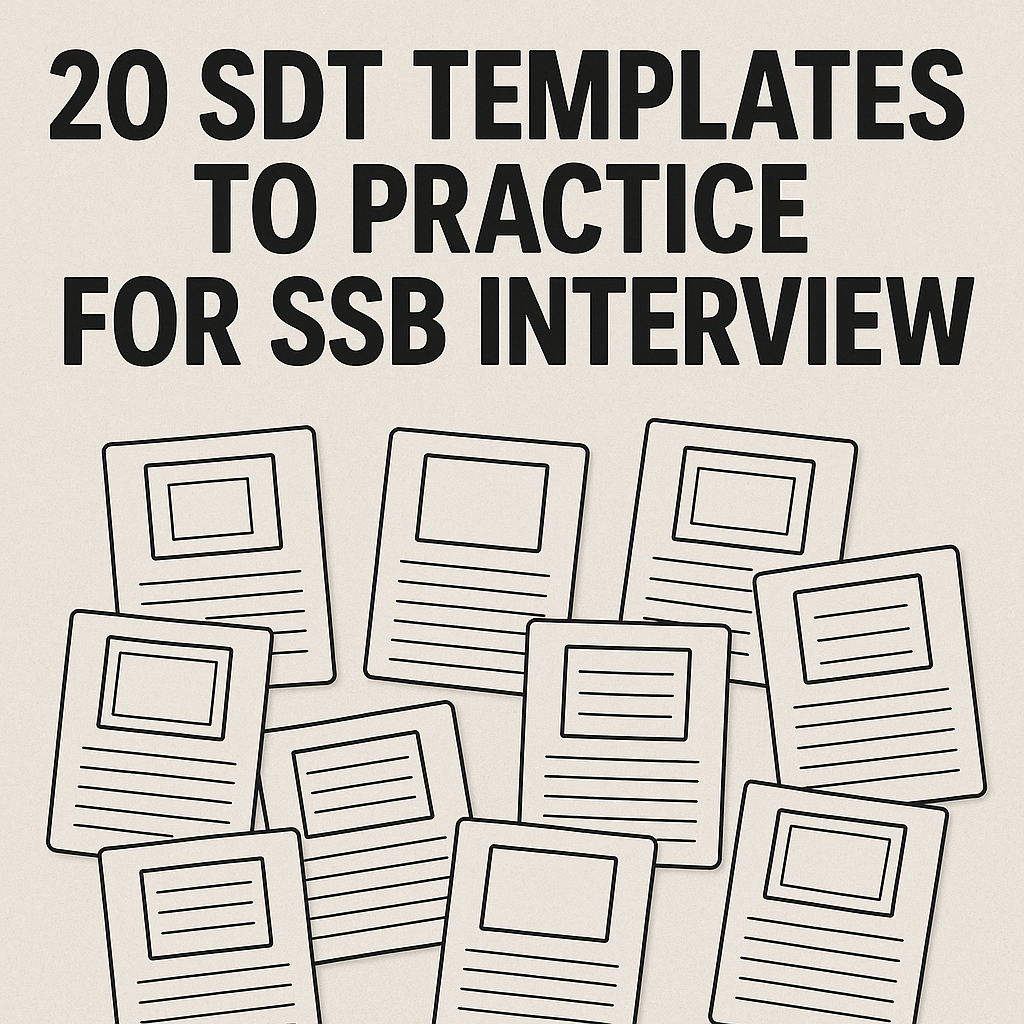The Self-Description Test (SDT) is an essential part of the SSB Interview process. It is designed to evaluate a candidate’s self-awareness, perception by others, and overall personality. Practicing with SDT templates helps candidates frame their thoughts better and express them confidently during the actual test.
This article presents 20 SDT templates to practice for various aspects of the Self-Description Test, making it easier for aspirants to reflect deeply and prepare authentically. These templates cover standard SDT segments like:
What your parents think of you
What your teachers think of you
What your friends think of you
What you think of yourself
What kind of person you want to become
Importance of SDT in SSB Interview
The SDT reveals how consistent and realistic a candidate is in assessing their own personality traits. It tests your:
Self-awareness
Honesty
Introspection ability
Goal orientation
SSB assessors look for consistency across different responses, which reflects a stable personality.
SDT Structure – 5 Key Components
What your parents think of you
What your teachers think of you
What your friends think of you
What you think of yourself
What kind of person you want to become
20 SDT TEMPLATES TO PRACTICE
1. What Your Parents Think of You
Template 1:
My parents see me as a sincere, obedient, and responsible individual. They appreciate my helping nature and trust me with household responsibilities. They often advise me to be more assertive.
Template 2:
They consider me mature and disciplined. My parents trust my decisions but believe I should improve my time management and become more emotionally expressive.
Template 3:
They are proud of my dedication towards my goals and appreciate my consistent efforts. However, they feel I should work on staying calm under pressure.
Template 4:
My parents find me helpful and caring. They believe I am intelligent and hardworking, although they advise me to socialize more and open up emotionally.
2. What Your Teachers Think of You
Template 5:
Teachers describe me as a focused and inquisitive learner. They often commend my leadership skills and classroom discipline.
Template 6:
They think of me as respectful, punctual, and a team player. I am appreciated for completing assignments diligently, though they suggest I participate more in class discussions.
Template 7:
My teachers consider me as a sincere student who is always willing to help peers. They often mention my potential to take initiative in group activities.
Template 8:
They acknowledge my technical knowledge and appreciate my balanced academic and extracurricular involvement.
3. What Your Friends Think of You
Template 9:
My friends see me as loyal, trustworthy, and someone they can depend on. They often approach me for advice due to my calm demeanor.
Template 10:
They find me friendly and cooperative. While they value my guidance and honesty, they sometimes say I take things too seriously.
Template 11:
Friends appreciate my sense of humor, honesty, and ability to motivate others. They often turn to me during stressful situations.
Template 12:
They say I am a good listener and a natural problem-solver. However, some feel I am too focused on my goals at times.
4. What You Think of Yourself
Template 13:
I consider myself a hardworking, disciplined, and goal-oriented individual. I always strive for self-improvement and value integrity.
Template 14:
I am optimistic, determined, and responsible. I believe in staying calm during challenges and learning from every failure.
Template 15:
I view myself as someone who believes in consistent efforts. I try to maintain a balance between work and life and value feedback to grow.
Template 16:
I am self-motivated and resilient. I believe in continuous learning and teamwork. However, I need to work on being less self-critical.
5. What Kind of Person You Want to Become
Template 17:
I want to become a balanced leader—disciplined, empathetic, and adaptable. My goal is to serve my country with courage and responsibility.
Template 18:
I aspire to become a confident and dependable officer who upholds integrity and inspires others by example.
Template 19:
I want to be someone who leads by values, contributes positively to society, and handles responsibilities with maturity.
Template 20:
I wish to grow into a person who is mentally strong, emotionally intelligent, and physically fit to meet the challenges of life and service.
Tips to Write Effective SDT Responses
Be honest and introspective
Avoid exaggeration and idealism
Use simple and clear language
Self-reflect based on real experiences
Practice writing within word limits (90–120 words)
Maintain consistency with PIQ and other responses
Common Mistakes to Avoid
Copying someone else’s SDT without personalization
Writing overly dramatic or unrealistic answers
Using complex vocabulary or abstract language
Being inconsistent across different sections
Ignoring feedback and revision
FAQs – 20 SDT Templates to Practice
Q1. How many SDT responses should I prepare?
You should prepare one personalized response for each of the five components. Practicing with multiple templates will help you find your best voice.
Q2. Can I memorize my SDT?
Memorizing is not advisable. Understand the flow and core points so that you can write naturally during the test.
Q3. Should my SDT match my PIQ form?
Yes. Your SDT should align with your PIQ form and responses in the interview. Any contradiction can create doubts in the minds of assessors.
Q4. How long should each SDT answer be?
Keep each section within 90–120 words. Be brief yet descriptive.
Q5. How do I know if my SDT is effective?
Read it aloud to yourself or share it with mentors. A good SDT should sound honest, confident, and consistent with your actions and experiences.
Conclusion
Writing a strong SDT takes practice, introspection, and self-honesty. Use these 20 SDT templates to reflect on your traits, gather feedback, and express yourself authentically. Remember, the SSB is not about perfection—it’s about being your true self with clarity and confidence.







